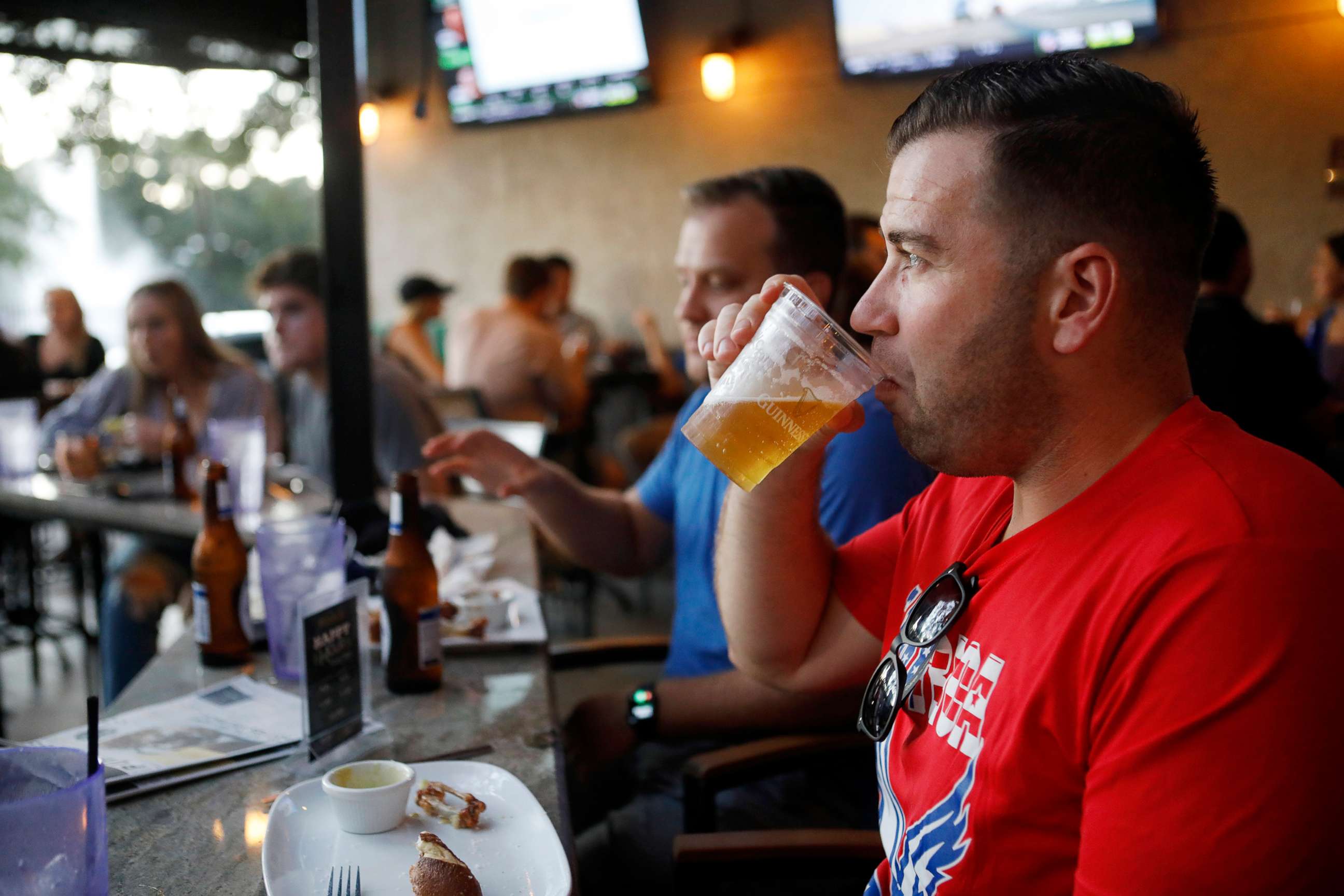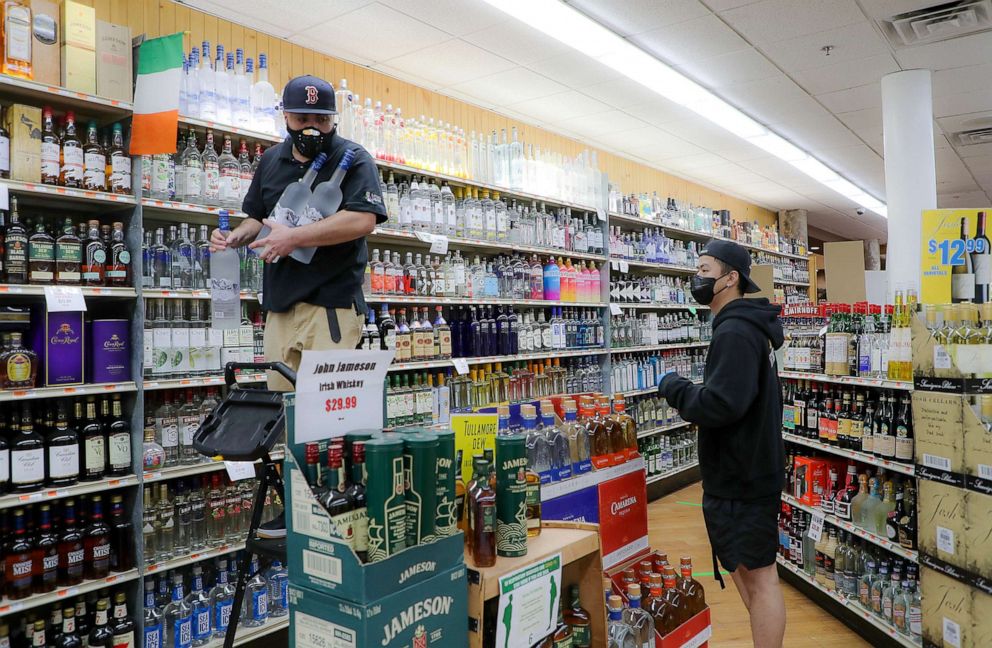Alcohol consumption rising sharply during pandemic, especially among women
An "effective pain killer" in a time of trauma sparks concern among experts.
Joe Dinan felt an anxious pulse in his ears as he walked out of CVS and spotted the liquor store across the street. Having lost his job during the pandemic, he'd had plenty of time to run errands. But he couldn't shake how hopeless he felt, marooned from his own sense of purpose. And the liquor store was right where he'd left it. A small bottle of vodka won out over his recovery.
In the age of pandemic, uncertainty lingers in the air. Now, new data shows that during the COVID-19 crisis, American adults have sharply increased their consumption of alcohol, drinking on more days per month, and to greater excess. Heavy drinking among women especially has soared.
The study, released Tuesday by the RAND corporation and supported by the National Institute of Alcohol Abuse and Alcoholism (NIAAA), compared adults' drinking habits from 2019 to now. Surveying 1,540 adults across a nationally representative panel, participants were asked about their shift in consumption between spring 2019 and spring 2020, during the virus' first peak.
Based on the results, experts say they're concerned about how people may be choosing to ease the pain and isolation wrought by the pandemic.
"The magnitude of these increases is striking," Michael Pollard, lead author of the study and a sociologist at RAND, told ABC. "People's depression increases, anxiety increases, [and] alcohol use is often a way to cope with these feelings. But depression and anxiety are also the outcome of drinking; it's this feedback loop where it just exacerbates the problem that it's trying to address."
Between 2019 and now during the pandemic, men and women both reported increasing the frequency of their binge drinking episodes, defined as five or more drinks for men and four or more drinks for women within a couple of hours. For women, that count rose by half.
"To move the average up by that much means that some people are really increasing their binge drinking," Pollard said. "For women in particular it can often be an overlooked issue, but it is a real concern."
The study shows that not only has consumption spiked, but respondents also say they've experienced more adverse impacts as a result of their drinking.
Respondents were presented with 15 possible negative outcomes and asked to identify which were true for them. Among the yes-or-no options were, "I have been unhappy because of my drinking," "I have felt guilty or ashamed because of my drinking," "I have taken foolish risks when I have been drinking," and "My family has been hurt by my drinking."
From 2019 to 2020, the average number of the 15 questions women responded "yes" to nearly doubled, from two last year to more than three during the pandemic. In 2019, men on average responded "yes" to four of the questions, compared to roughly five in 2020.
"There is a history with events like 911, Hurricane Katrina, earthquakes and other catastrophes, that people then drink more, post-trauma," NIAAA Director Dr. George Koob told ABC. "Alcohol is a very effective pain killer. But when it wears off, that pain comes back with a vengeance."
Dinan, 42, has been working to get his drinking under control for the past seven years. He's gotten back on track now, but the stress of the pandemic has made it harder than ever before.
"It got to a point when everything just compounded, and I didn't know what to do," Dinan said. "When you're in recovery, you're told you shouldn't isolate, and now that's exactly what we've been told to do. We drink to hide from feelings, hide from life. We tend to isolate. Especially when addiction really gets advanced. Now people are isolated at home. And it presents a real challenge."
"Even when we're doing well, for someone in recovery who's been doing really well, our demons return with stress, and can trigger relapse," Koob said.
Sarah Hepola, a writer and recovered alcoholic whose bestselling memoir, "Blackout: Remembering the Things I Drank to Forget," addressed her substance abuse, has been candid about the struggle and how hard it is for people to stay sane and sober amid the shutdown.
"The world took the rest of the coping mechanisms away -- and so you have this one thing and it has a kind of wicked allure," Hepola told ABC. "I was very called by that voice of romantic doom -- heading to the liquor store for 'supplies' -- like it was a camping trip. And it sort of was. I was going on a camping trip from life."
It's an appealing escape hatch from reality, experts say, especially when that reality has begun to feel dystopian. That appeal, RAND's data shows, appears especially strong for women.

"It's a perfect drug for women in particular, in a lot of ways," Hepola said. "Makes you feel braver, empowered, strong, it's a pain management system -- and it's a forgetting drug, and a lot of us are in a place where we just don't want to think a lot right now. And as far as women go right now, a lot of them are bearing the biggest burden of dealing with both work and added domestic stresses, home schooling, childcare, keeping the household from falling apart. A glass of wine or two, 'mother's little helper,' that's socially acceptable."
Drinking in and of itself is not a negative thing -- it's built into our social infrastructure as a way of bringing loved ones together over shared experiences. That's remained true during the pandemic, where Zoom cocktail parties have taken the place of traditional gatherings.
During the shutdown, innovative ways of bringing booze home took off, with online app sales connecting consumers with liquor stores for home delivery. One such company, Drizly, told ABC that during the early lockdown days, they saw growth surge of 700-800%. It's leveled off some since then, but they're still sitting at 350% growth since last year.
But with that unprecedented demand, Drizly's Liz Paquette said, comes a responsibility to wield their product mindfully.
"At a time when we're frightfully socially distancing, retaining connection with our loved ones is important for a lot of people," Paquette said. "But it can be a slippery slope. And so we practice a lot of care with our messaging and communication. We're careful to make sure we're not insinuating alcohol should be used as a coping mechanism. We don't glorify getting drunk. We don't push shots."
When they began seeing their sales snowball, Paquette said, they put a pause on their paid media spending -- making sure they had both supplies and safe messaging in place to meet the influx of demand.
"It's important to us both as humans at this company, and as an organization, that we understand our role within this space and make sure we're acting in a way that's as responsible as possible," Paquette said.
When alcohol becomes a crutch to sublimate unwanted pain, however, it becomes a problem.

"It's one way to deal with this stress," Koob said, "but when you start drinking to fix something or to not feel something, the alcohol makes it worse. It gets very insidious."
As the coronavirus began to spread this spring, and alcohol sales began to spike, the World Health Organization warned that alcohol use could potentially exacerbate health issues and risk-taking behaviors.
Alcohol abuse poses unique risks in the current COVID-19 crisis, potentially making people more vulnerable to disease, experts say.
"Chronic alcohol consumption has historically been shown to increase the risk for acute respiratory distress syndrome," Koob said. Fluid builds up in the lungs, keeping them from filling with enough air. Less oxygen reaches the bloodstream, depriving organs of what they need to function.
"At a moment when we're supposed to be extra careful, this seems a particularly bad time for impaired judgment when we're supposed to be paying close attention to our behaviors," Pollard said. "There are real risks with lasting consequences."
As a result, say experts, this unprecedented crisis may offer new opportunities to rethink pain management.
"People may not want to quit drinking because they don't want to change their world," Hepola said. "But now, the world has changed. And we're here whether we like it or not. So the question becomes, who do you want to be?"
If you or someone close to you needs help for a substance use disorder, call the Substance Abuse and Mental Health Services Administration (SAMHSA) National Helpline at 1-800-662-HELP (4357) or visit FindTreatment.gov, SAMHSA’s Behavioral Health Treatment Services Locator.
ABC News' Sony Salzman and Eric Strauss contributed to this report.




